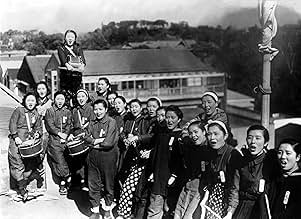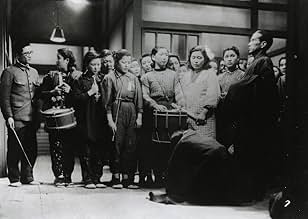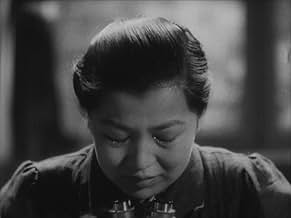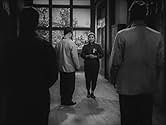AVALIAÇÃO DA IMDb
5,6/10
2,6 mil
SUA AVALIAÇÃO
Adicionar um enredo no seu idiomaWorld War II film about female volunteer workers at an optics plant who do their best to meet production targets.World War II film about female volunteer workers at an optics plant who do their best to meet production targets.World War II film about female volunteer workers at an optics plant who do their best to meet production targets.
Avaliações em destaque
Most Beautiful, The (1944)
** (out of 4)
Interesting WW2 era film about a factory in Japan who asks their men to raise production by 100% and then ask the women to do 50%. At first the women are insulted by not being asked to do as much as the men but they soon find out that this raise in production is going to test every bit of their soul both physically and mentally. This early Kurosawa film isn't a good one but it is interesting and does have a few moments where the director does something great. What I found most interesting about the film is how different it is from the WW2 films that were being produced in Hollywood at the time. There's no question that this is a propaganda piece for the Japanese people but it's interesting to see how their moral was attempted at being raised. Most of the American WW2 pictures were "fight, fight, fight" and you can say that about this film but the difference is that the fight is mostly a personal drama with each of the women. Then being ashamed that they can't produce more for their country. Being ashamed that they are sick and can't do their part for a day. Ashamed that their parents might learn they were sick and couldn't do the job. The film does a pretty good job at building up these dramas but sadly none of their stories are strong enough to make the film be a total success. I think most of the blame has to go towards the screenplay that is a bit too over dramatic during certain scenes and there are some major issues with some of the performances. It's obvious Toho didn't give Kurosawa much of a budget but the director shows that he can handle the personal drama quite nicely. The most impressive sequence in the film happens early on when the women are told that production is going to be raised. This somewhat long sequence shows us many of the women talking amongst each other and Kurosawa builds up us thinking they're unhappy about the raise but the way he explains what they're really upset about was quite powerful. The film runs 85-minutes and even at this short pace the film begins to run out of gas and really drag along towards the end. Fans of Kurosawa will probably want to check this out but others will probably hit the stop button early on.
** (out of 4)
Interesting WW2 era film about a factory in Japan who asks their men to raise production by 100% and then ask the women to do 50%. At first the women are insulted by not being asked to do as much as the men but they soon find out that this raise in production is going to test every bit of their soul both physically and mentally. This early Kurosawa film isn't a good one but it is interesting and does have a few moments where the director does something great. What I found most interesting about the film is how different it is from the WW2 films that were being produced in Hollywood at the time. There's no question that this is a propaganda piece for the Japanese people but it's interesting to see how their moral was attempted at being raised. Most of the American WW2 pictures were "fight, fight, fight" and you can say that about this film but the difference is that the fight is mostly a personal drama with each of the women. Then being ashamed that they can't produce more for their country. Being ashamed that they are sick and can't do their part for a day. Ashamed that their parents might learn they were sick and couldn't do the job. The film does a pretty good job at building up these dramas but sadly none of their stories are strong enough to make the film be a total success. I think most of the blame has to go towards the screenplay that is a bit too over dramatic during certain scenes and there are some major issues with some of the performances. It's obvious Toho didn't give Kurosawa much of a budget but the director shows that he can handle the personal drama quite nicely. The most impressive sequence in the film happens early on when the women are told that production is going to be raised. This somewhat long sequence shows us many of the women talking amongst each other and Kurosawa builds up us thinking they're unhappy about the raise but the way he explains what they're really upset about was quite powerful. The film runs 85-minutes and even at this short pace the film begins to run out of gas and really drag along towards the end. Fans of Kurosawa will probably want to check this out but others will probably hit the stop button early on.
During the World War II, the management of a war industry of optical instruments for weapons requests an effort from the workers to increase the productivity during four months. The target for male workers is an increase of 100% of the production, but the female workers, led by the dedicated Tsuru Watanabe (Yôko Yaguchi), ask the direction to surpass their goal from 50% to 70%. Along the period, the women have to overcome illness and their personal problems to complete their quote.
"Ichiban Utsukushiku" is a war propaganda and tribute to the Japanese female workers in times of war by Akira Kurosawa recommended only for fans of this great director. The plot is boring in many moments, but I liked to see the humanization of the nationalist Japanese workers and this unusual perspective from a people that were sooner defeated in the war. The winners usually write the history from their perspective and this film is a rare testimony from the Japanese point of view. Watanabe is an enlightened character with her dedication and positive leadership. My vote is six.
Title (Brazil): "A Mais Bela" ("The Most Beautiful")
"Ichiban Utsukushiku" is a war propaganda and tribute to the Japanese female workers in times of war by Akira Kurosawa recommended only for fans of this great director. The plot is boring in many moments, but I liked to see the humanization of the nationalist Japanese workers and this unusual perspective from a people that were sooner defeated in the war. The winners usually write the history from their perspective and this film is a rare testimony from the Japanese point of view. Watanabe is an enlightened character with her dedication and positive leadership. My vote is six.
Title (Brazil): "A Mais Bela" ("The Most Beautiful")
A curious film from Kurosawa, given what came later, this is a nationalist film about a group of young women who are working at an optical instruments factory who are given the task to greatly increase productivity for the good of the country and the war effort. It shows them rarely at play, mostly very focused at work. Takako Irie plays the dorm mother, a somewhat sympathetic character. This film is more inherently Japanese than most of Kurosawa's later work, its almost a propaganda film. However, there is also some heart in the characters, and that is what makes it a recommended film. You sense the young ladies anguish over being sick and having family difficulties, making them unable to work. So, not essential viewing but still watchable and Kurosawa fans should check it out.
Typical of Japanese war-time propaganda, the film suggests that Japan's fascist ideology, its inculcation of fanatical obedience, its vast perpetration of unthinkable atrocities in a systematic manner, and its aggressive military expansionism can all be replaced by Japan's supposed victimization. Rather telling in this respect is the song that the girls repeatedly sing to boost morale, a song that recalls that barbarian Mongol conquerors once tried to invade Japan from China, but that the perpetrators of such heinous deeds of aggression could not possibly co-exist under the same sky with the innocent and pure Japanese-- this, of course, is being sung during a war that was begun when an utterly unprovoked Japan invaded China and slaughtered untold numbers of its population mercilessly.
All of this would be something that one could simply shrug off as the past blindness of war, but films such as these are more disturbing today than, say, Triumph of the Will because while Germany was forced to confront the horrors it had unleashed upon the world, most Japanese films even today (and textbooks for that matter) still tend to view Japan as a victim in the war (see, for instance, Kurosawa's own Rhapsody in August so many decades later). Assisted by the policies of the American post-war occupation, Japan has never had to come to terms with what it did to the planet, and what in human history can possibly more disturbing than a lack of accountability for the worst sins humanity can commit? And by the way, I say all of this despite the fact that Kurosawa is probably my favorite director.
All of this would be something that one could simply shrug off as the past blindness of war, but films such as these are more disturbing today than, say, Triumph of the Will because while Germany was forced to confront the horrors it had unleashed upon the world, most Japanese films even today (and textbooks for that matter) still tend to view Japan as a victim in the war (see, for instance, Kurosawa's own Rhapsody in August so many decades later). Assisted by the policies of the American post-war occupation, Japan has never had to come to terms with what it did to the planet, and what in human history can possibly more disturbing than a lack of accountability for the worst sins humanity can commit? And by the way, I say all of this despite the fact that Kurosawa is probably my favorite director.
10matt605
If you study this film then you can learn much about Japan, World War Two, and Akira Kurosawa. This is the only film he made that was meant to be propaganda, but his earlier film Sanshiro Sugata actually played to themes more useful to a nation at war. If you make a film that matches the zeitgeist of your country, that's great. But be forewarned that your country's government may then ask you to inspire the people to fight on, and you would then make a propaganda film, which is what may have happened to Kurosawa. This fact shouldn't make you reject The Most Beautiful because cinema in all countries in WW2 was used in the war effort. Japan was no exception.
Kurosawa in interviews after the war revealed his dislike of the government censors. Toward the end of the war, Japanese were preparing for the possibility of the entire nation receiving an order from the Emporer to commit suicide, called "the Honorable Death of the 100 Million." Kurosawa didn't dispute that he would have followed the Emporer's directive, but did say that he and his colleagues jokingly agreed they would first go and kill all the censors.
The plot and action of the film is described elsewhere. There are things to watch for carefully as you view the film.
If you're in a university setting then there is one absolute advantage that you have -- access to a professor of management and organizational behavior. Why? Well, The Most Beautiful is practically a docu-drama on management science. The scientific methods of production and organizational management are more clearly documented in this film than in any other I can recall, anywhere. It also compares things like Stakhanovism to Hawthorne experiment studies and displays the early beginnings of total quality management and quality assurance methods later developed by Deming. If these terms are unfamiliar to you, then you need a professor of management science to watch the film and help you see what Kurosawa was putting in. Then consider that the film was released to the Japanese public, which assured that it would be viewed by American military intelligence organizations and the OSS.
Some specifics to look for in no particular order: the background music includes a sampling from Semper Fi, the USMC theme song; there's little talk of enemies but when they're mentioned, the British are named ahead of Americans; the factory managers back a young woman's rejection of her father's instruction to come home and take the place of his deceased wife, which is a break with tradition (almost the equivalent of bra-burning in wartime Japan); and, backgrounds are set in wartime Japan and reveal details of the industrial infrastructure.
There are many films by Kurosawa that feature sickness and health care in their plots. This one, Drunken Angel, Ikuru, The Quiet Duel, and Red Beard come to mind. Dodes' ka-den and Ran might also qualify as their main characters suffer from afflictions of the mind. Kurosawa's biggest films are Rashomon and The Seven Samurai, but his films with health and medicine in the plot are more prevalent in his career.
One caveat to The Most Beautiful is that it is long and does reflect the tastes of Japanese audiences who like their drama very obvious. Forgive yourself if you find Japanese drama becomes too boring in some places. The films can be very enjoyable and interesting, provided you approach them with the understanding that they are far different from what we experience as entertainment today.
Kurosawa in interviews after the war revealed his dislike of the government censors. Toward the end of the war, Japanese were preparing for the possibility of the entire nation receiving an order from the Emporer to commit suicide, called "the Honorable Death of the 100 Million." Kurosawa didn't dispute that he would have followed the Emporer's directive, but did say that he and his colleagues jokingly agreed they would first go and kill all the censors.
The plot and action of the film is described elsewhere. There are things to watch for carefully as you view the film.
If you're in a university setting then there is one absolute advantage that you have -- access to a professor of management and organizational behavior. Why? Well, The Most Beautiful is practically a docu-drama on management science. The scientific methods of production and organizational management are more clearly documented in this film than in any other I can recall, anywhere. It also compares things like Stakhanovism to Hawthorne experiment studies and displays the early beginnings of total quality management and quality assurance methods later developed by Deming. If these terms are unfamiliar to you, then you need a professor of management science to watch the film and help you see what Kurosawa was putting in. Then consider that the film was released to the Japanese public, which assured that it would be viewed by American military intelligence organizations and the OSS.
Some specifics to look for in no particular order: the background music includes a sampling from Semper Fi, the USMC theme song; there's little talk of enemies but when they're mentioned, the British are named ahead of Americans; the factory managers back a young woman's rejection of her father's instruction to come home and take the place of his deceased wife, which is a break with tradition (almost the equivalent of bra-burning in wartime Japan); and, backgrounds are set in wartime Japan and reveal details of the industrial infrastructure.
There are many films by Kurosawa that feature sickness and health care in their plots. This one, Drunken Angel, Ikuru, The Quiet Duel, and Red Beard come to mind. Dodes' ka-den and Ran might also qualify as their main characters suffer from afflictions of the mind. Kurosawa's biggest films are Rashomon and The Seven Samurai, but his films with health and medicine in the plot are more prevalent in his career.
One caveat to The Most Beautiful is that it is long and does reflect the tastes of Japanese audiences who like their drama very obvious. Forgive yourself if you find Japanese drama becomes too boring in some places. The films can be very enjoyable and interesting, provided you approach them with the understanding that they are far different from what we experience as entertainment today.
Você sabia?
- CuriosidadesIn order to save film during wartime, the Japanese government ordered films to be released to have no opening titles and thus giving no credit to most of the actors or workers on each film. This included "The Most Beautiful" (1944).
- ConexõesReferenced in Kurosawa: The Last Emperor (1999)
Principais escolhas
Faça login para avaliar e ver a lista de recomendações personalizadas
- How long is The Most Beautiful?Fornecido pela Alexa
Detalhes
- Tempo de duração1 hora 25 minutos
- Cor
- Mixagem de som
- Proporção
- 1.37 : 1
Contribua para esta página
Sugerir uma alteração ou adicionar conteúdo ausente

Principal brecha
By what name was A Mais Bela (1944) officially released in Canada in English?
Responda
















